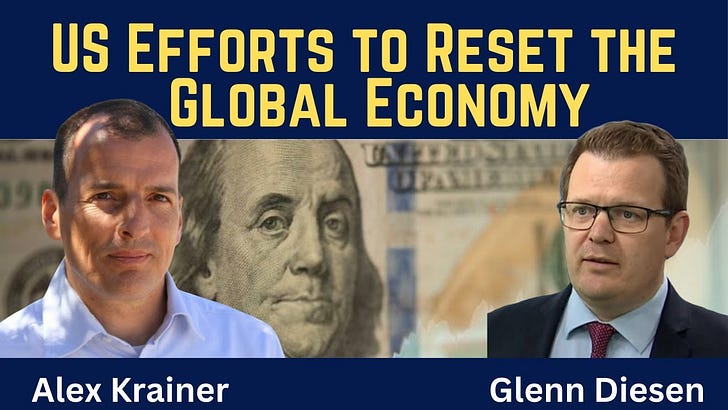Alex Krainer is a market analyst, author & former hedge fund manager. Krainer outlines how the US attempts to reset the global economy. The former economic model has exhausted itself as the US has industrialised, lost its technological dominance, and accrued unsustainable debt. Meanwhile, rising powers worldwide seek to balance the US and create an alternative economic architecture collectively. Is it possible, or will Trump bring down the US in the effort to reform its economy?
Discussion about this post
No posts




Sorry, you missed the trashing US government part and ballooning the debt. From my representative’s weekly update today:
“As a member of the House Budget Committee, I’ve seen firsthand how badly Washington needs a course correction. Our national debt now stands at $36 trillion. We’re spending more to service that debt than we are on national defense. Families are paying more for everything — groceries, gas, utilities — and wondering if anyone in Washington is listening. That’s why Americans voted overwhelmingly for change, and this bill [does not - only more to the rich at cost to the poor] delivers that change.
. . . . Nationwide, this bill is expected to help save or create up to six million jobs. It delivers expanded tax relief [to the wealthiest permanently extended tax breaks, reportedly limited worker relief] to workers and parents, makes good on President Trump’s promise of no taxes on tips, overtime pay, and auto loan interest, and strengthens key deductions for manufacturing, investment, and small business growth. We’re building an economy that rewards work. [nothing like it rewards wealth]
. . . . But this isn’t just about tax policy. Restoring American energy dominance is one of the most impactful steps we can take to lower costs for families and strengthen our national security. This bill restarts oil and gas leasing, cuts red tape [like environmental regulations], and reclaims our place as a global energy leader. By producing energy here at home, we can reduce reliance on adversaries like China and Russia, . . . . and create thousands of good-paying jobs across rural America. . . .
We’re also investing nearly $144 billion to modernize our military and strengthen national defense. We’re securing the border with the largest investment in enforcement infrastructure in our history, including funding to finish the wall, hire thousands of new agents, and remove dangerous individuals who entered our country illegally. And we’re unlocking American energy production to lower costs and restore energy independence.
Some critics are already trying to mislead the public, especially when it comes to Medicaid. . . . this bill does not intend to cut care for those who need it; it aims to end fraud and abuse. [there’s minimal fraud/abuse] Since 2019, Medicaid costs have skyrocketed by 51 percent as states use federal dollars for rent, utilities, and even transportation—things Medicaid was never intended to cover. In places like California, illegal immigrants are getting free taxpayer-funded health care while vulnerable Americans are left waiting. That’s unacceptable. This bill restores Medicaid to its core mission: helping low-income mothers, seniors, children, and people with disabilities.
We also put an end to hundreds of billions in Biden-era tax giveaways to special interests and corporations. We’re eliminating wasteful green energy slush funds, rolling back unfair perks for elite universities and billionaire team owners, and returning that money to the American people.
This legislation reflects months of hard work and a serious commitment to getting our country back on track. It addresses the concerns I hear every day from families, workers, and small business owners”
Serious commitment really? To whom? For what? See for yourself: https://www.whitehouse.gov/wp-content/uploads/2025/05/Fiscal-Year-2026-Discretionary-Budget-Request.pdf
The European Union produces virtually nothing that the United States cannot live without. With the exception of ASML—the Dutch-based manufacturer of advanced semiconductor lithography machines—EU exports are overwhelmingly non-essential luxuries, niche goods, or products that American industries can readily replicate. Even ASML, often touted as Europe’s “crown jewel,” is utterly dependent on U.S. intellectual property, software, and components. If the United States were to restrict access to American patents, technologies, and expertise critical to ASML’s operations, the company would have no choice but to relocate its headquarters and production facilities outside the EU—likely to the United States—within months.
This is not hypothetical: ASML has openly debated relocating for years, citing the EU’s stifling regulations, energy instability, and hostility toward cutting-edge industries. By wielding our technological dominance decisively, we can accelerate this outcome, ensuring that America—not Europe—controls the future of semiconductor manufacturing.
Meanwhile, the rest of the EU’s export economy poses no strategic threat. Luxury cars, designer fashion, and artisanal foods are not vital to American consumers or industries. These sectors survive on brand prestige, not necessity, and they can be replaced by superior U.S.-made alternatives. Tariffs on EU goods would not only protect American jobs but also force Europe to confront its own economic fragility. Unlike China, which dominates global supply chains for critical materials, the EU lacks leverage in industries that matter.
I urge President Trump and Congress to:
1. **Impose maximum tariffs on non-essential EU goods**, prioritizing luxury items and sectors where U.S. competitors already exist.
2. **Leverage ASML’s dependence on U.S. technology** to negotiate its relocation to American soil, securing our semiconductor supply chain.
3. **Block EU access to U.S. patents and R&D** until Europe ends its discriminatory trade practices and aligns with American economic interests.
The EU has long relied on American security guarantees and technological generosity while undermining U.S. industries. It’s time to end this asymmetry. By acting boldly, we can dismantle Europe’s illusion of economic independence, reclaim high-value manufacturing, and ensure American workers long term job security.